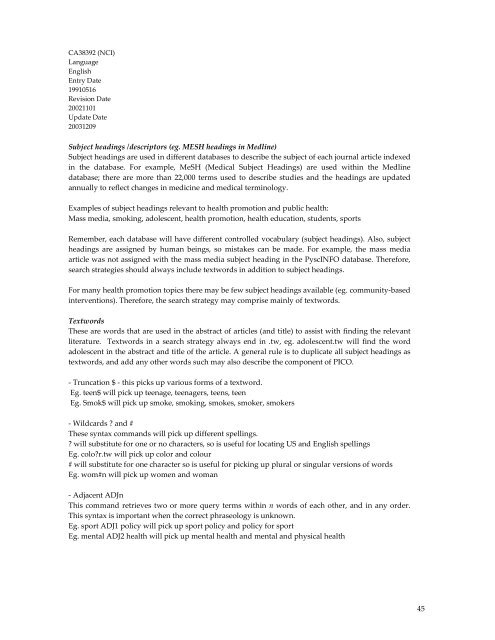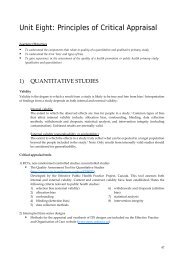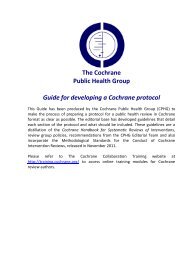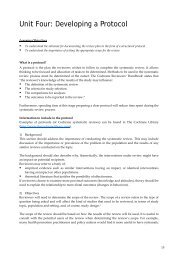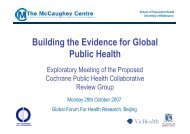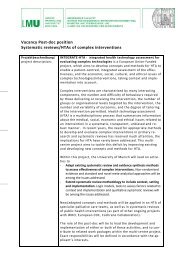Train the Trainer Course book - Cochrane Public Health Group
Train the Trainer Course book - Cochrane Public Health Group
Train the Trainer Course book - Cochrane Public Health Group
You also want an ePaper? Increase the reach of your titles
YUMPU automatically turns print PDFs into web optimized ePapers that Google loves.
CA38392 (NCI)<br />
Language<br />
English<br />
Entry Date<br />
19910516<br />
Revision Date<br />
20021101<br />
Update Date<br />
20031209<br />
Subject headings /descriptors (eg. MESH headings in Medline)<br />
Subject headings are used in different databases to describe <strong>the</strong> subject of each journal article indexed<br />
in <strong>the</strong> database. For example, MeSH (Medical Subject Headings) are used within <strong>the</strong> Medline<br />
database; <strong>the</strong>re are more than 22,000 terms used to describe studies and <strong>the</strong> headings are updated<br />
annually to reflect changes in medicine and medical terminology.<br />
Examples of subject headings relevant to health promotion and public health:<br />
Mass media, smoking, adolescent, health promotion, health education, students, sports<br />
Remember, each database will have different controlled vocabulary (subject headings). Also, subject<br />
headings are assigned by human beings, so mistakes can be made. For example, <strong>the</strong> mass media<br />
article was not assigned with <strong>the</strong> mass media subject heading in <strong>the</strong> PyscINFO database. Therefore,<br />
search strategies should always include textwords in addition to subject headings.<br />
For many health promotion topics <strong>the</strong>re may be few subject headings available (eg. community-based<br />
interventions). Therefore, <strong>the</strong> search strategy may comprise mainly of textwords.<br />
Textwords<br />
These are words that are used in <strong>the</strong> abstract of articles (and title) to assist with finding <strong>the</strong> relevant<br />
literature. Textwords in a search strategy always end in .tw, eg. adolescent.tw will find <strong>the</strong> word<br />
adolescent in <strong>the</strong> abstract and title of <strong>the</strong> article. A general rule is to duplicate all subject headings as<br />
textwords, and add any o<strong>the</strong>r words such may also describe <strong>the</strong> component of PICO.<br />
- Truncation $ - this picks up various forms of a textword.<br />
Eg. teen$ will pick up teenage, teenagers, teens, teen<br />
Eg. Smok$ will pick up smoke, smoking, smokes, smoker, smokers<br />
- Wildcards ? and #<br />
These syntax commands will pick up different spellings.<br />
? will substitute for one or no characters, so is useful for locating US and English spellings<br />
Eg. colo?r.tw will pick up color and colour<br />
# will substitute for one character so is useful for picking up plural or singular versions of words<br />
Eg. wom#n will pick up women and woman<br />
- Adjacent ADJn<br />
This command retrieves two or more query terms within n words of each o<strong>the</strong>r, and in any order.<br />
This syntax is important when <strong>the</strong> correct phraseology is unknown.<br />
Eg. sport ADJ1 policy will pick up sport policy and policy for sport<br />
Eg. mental ADJ2 health will pick up mental health and mental and physical health<br />
45


